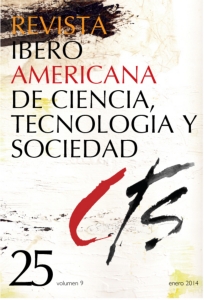Socio-technical constraints of political decisions
The Chilean tsunami of February 27, 2010
DOI:
https://doi.org/10.52712/issn.1850-0013-619Keywords:
socio-technical controversies, disasters, complexityAbstract
After the earthquake of February 27, 2010, in Chile, one of the most widespread criticisms in mass media was the lack of information, the perplexity and the inoperative political decisions linked to the evacuation of the population in the coastal areas along the Pacific. We are faced with a problem of governance and management of knowledge and scientific information that may have several causes: the magnitude of the natural disaster that may have left people with no chance to react; the political responsibility for delayed decision-making; and the deficient technological infrastructure and technical level of the civil servants. The article emphasizes the link between science, technology and society and indicates that the socio-technical network that produces and circulates information and knowledge is that which creates the conditions of possibility in these complex social situations. The problem of the “alarm” is thus analyzed as a technical-symbolic condenser that renders comprehensible the way in which the operators of scientific information, their networks and the problem of the maps and metrology in use are assembled. The problem is approached from the point of view of the political complexity of the controversy that the events of February 27, 2010, ignited in Chile and the way in which a scientific controversy plays out in the public domain.
Downloads
References
AVILA, J.; BUTI, A. y CANCINO, R. (2011): Redes y Resolución de Conflictos. Ponencia presentada al Grupo de Trabajo “Ciencia, Tecnología e Innovación”, XXVIII Congreso Internacional de la Asociación Latinoamericana de Sociologia (ALAS), 6 a 11 de septiembre de 2011, UFPE, Recife-PE.
CALLON, M. (2006): “Pour une sociologie des controverse technologiques”, en M. Akrich, M. Callon, y B. Latour: Sociologie de la traduction, París, Mines Paris Presses.
CANCINO, R. y GÓMEZ, A. (2011): Tsunamis y producción de conocimiento científico (disputas de conocimiento, problemas de governance, y dilemas de gestión de datos de investigación e información científica), III Taller regional “Ciencia, Tecnología y Desarrollo social. Repensando la dinámica del conocimiento frente a los problemas de la sociedad”, Noviembre 3 DE 2011. Centro Redes, Buenos Aires, Argentina.
CANCINO, R. (2009): “Sistemas Regionales de Innovación en Chile: estado actual y escenarios de futuro”, en E. Von Baer (ed.): Pensando Chile desde sus regiones, Ediciones Universidad de la Frontera, Temuco, Ediciones Universidad de La Frontera.
CHARAUDEAU, P.; LOCHARD, G. y FERNÁNDEZ, M. (2012): La controversia científica: la clonación, Jornades Internacionals sobre la controvèrsia cientìfica i social en els mèdia, Barcelona.
GARCÍA HOM, A.; MOLES PLAZA, R. J.; PALMÉN, R. y FABREGUES, S. (2009): “Reconsiderando la gestión de riesgos en entornos sociotécnicos”, Papers, nº 93, pp. 103-126.
INSTITUTO DE DESARROLLO REGIONAL Y LOCAL DE LA UNIVERSIDAD DE LA FRONTERA/CONICYT (2009): Consultoría Estado del Arte Nacional e Internacional sobre Manejo y Políticas de Acceso a Datos de Investigación e Información Científica y Tecnológica Financiada con Fondos y Recomendaciones de Buenas Prácticas.
LATOUR, B. (2008): Reensamblar lo social, Ediciones Manantial.
LUHMANN, N. (1996): Confianza, México, Anthropos-Universidad Iberoamericana.
OECD (2007): OECD Principles and Guidelines for Access to Research Data from Public Funding.
PADILLA, P.; CURAQUEO, O.; CANCINO, R. y GATICA, M. (s/f): “Chile y los estándares internacionales sobre acceso a datos de investigación e información científica”, Revista española de documentación científica. En prensa.
SANHUEZA, P.; RODRÍGUEZ, I. y PADILLA, P. (2012): “Difusión y Acceso a Datos e Información Científica y Tecnológica en la Normativa de Fondos Públicos para la Innovación en Chile”, Journal of Technology Management & Innovation.
SEGUEL, A. G. (2011): “Experimentar y codificar: consecuencias simbólicas del artefacto tecnológico”, Teknokultura, vol 8, nº 1, pp. 60-75.
VENTURINI, T. (2010): “Diving in magma: how to explore controversies with actor- network theory”, Public Understanding of Science, n° 19, pp. 258-273.
Downloads
Published
How to Cite
Issue
Section
License
Copyright (c) 2024 CC Attribution 4.0

This work is licensed under a Creative Commons Attribution 4.0 International License.
All CTS's issues and academic articles are under a CC-BY license.
Since 2007, CTS has provided open and free access to all its contents, including the complete archive of its quarterly edition and the different products presented in its electronic platform. This decision is based on the belief that offering free access to published materials helps to build a greater and better exchange of knowledge.
In turn, for the quarterly edition, CTS allows institutional and thematic repositories, as well as personal web pages, to self-archive articles in their post-print or editorial version, immediately after the publication of the final version of each issue and under the condition that a link to the original source will be incorporated into the self-archive.











